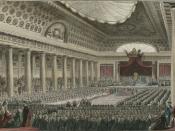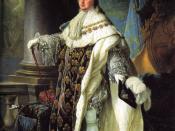The Causes of the French Revolution.
The French revolution overthrew the country?s ancient monarchy, proclaimed Liberty, Equality and Fraternity and fought off a hostile Europe. It ushered in a new age, but at a terrible price in blood and human suffering. There were many causes of the Revolution. The French Revolution appears to have been the outcome of both long term and short term factors, which arose from the social and political conditions and conflicts of the ancien regime. The long standing grievances of peasants, townsmen and bourgeoisie; the frustration?s of rising hopes among wealthy and ?middling? bourgeoisie and peasants; the distress and breakdown of government; a real (or at least perceived) ?feudal reaction?; the stubbornness of a privileged aristocracy; the creation of radical ideas among wide sections of the people; a sharp economic and financial crisis; and the successive triggers of state bankruptcy, aristocratic revolt and popular revolution: all these factors played a part.
The middle and lower class were becoming more conscious of their increased social importance and because the peasants were becoming more independent, more literate and prosperous that the old feudal freedoms and aristocratic privileges appeared all the more burdensome and intolerable for the struggling discontents of France.
For more than one hundred years before the accession of Louis XVI, France was the most powerful country on the European continent. She had held this position for over 150 years, thanks to her fertile land, large population and many resources. However, the government had under gone periodic economic crisis, resulting from long wars, royal mismanagement, losses incurred in the French and Indian War (1756-1763) and Seven Years? War (1775-1783) and increased debt arising from loans to the American colonies during the American Revolution (1775-1783). The governmental system had worked reasonably well under Louis XIV but had become...


